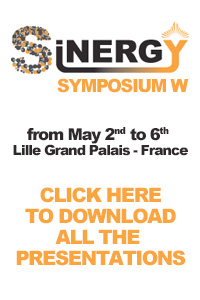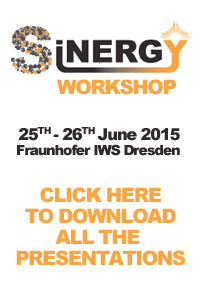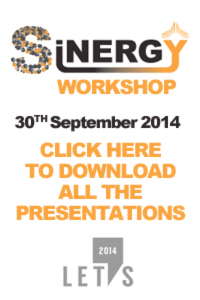
Privacy Policy
Privacy Policy & Cookie Information
Information processing personal data
The data collected on the website will not in any event disclosed in the network or transferred to third parties, subject to any legal requirements and technical needs related to the service.
The data controller is the legal representative of Confindustria Emilia-Romagna Research, Mr. Maurizio Marchesini.
The treatment will be achieved with the aid of computerized by the owner and operators commissioned by it.
The treatment is to provide the services requested, the compilation of statistics on the use of the same services and sending promotional information either in digital or paper.
Anytime you can ask for the verification, cancellation, modification of their data, or receive the list of appointees to the treatment, by writing an email to This email address is being protected from spambots. You need JavaScript enabled to view it.
, or by written communication addressed to: Confindustria Emilia -Romagna Research, Barbary Via 13, 40123 Bologna.
Besides uniformarci to all obligations under the Legislative Decree 196/2003, we guarantee the utmost attention to data protection from fraudulent access and the immediate cancellation from our lists as a result of direct requests of the user.
Information on the use of cookies
This website uses cookies and similar technologies to ensure the proper functioning of procedures and improve the experience of use of online applications. The following detailed information on the use of cookies.
Definitions
Cookies are short pieces of text (letters and / or numbers) that allow the web server to store on the client (browser) information to be reused during the same visit to the site (session cookies) or later, even after days (persistent cookies). Cookies are stored, according to user preferences from a single browser on the specific device being used (computer, tablet, smartphone).
Similar technologies, such as, for example, web beacons, clear GIFs and all forms of local storage introduced with HTML5, can be used to gather information on user behavior and use of services.
Later in this document will refer to cookies and similar technologies all by simply using the word "cookie".
Types of cookies
Based on the characteristics and use of cookies, we can distinguish several categories:
Cookies are strictly necessary (technical). These cookies are essential for the proper functioning of our site. The duration of cookies is strictly limited to the working session (closed the browser are deleted).
Cookie analysis and performance. Cookies are used to collect and analyze traffic and use the site anonymously. These cookies, even without identifying the user, allow, for example, to detect if the same user returns to connect at different times. They also allow you to monitor the system and improve its performance and usability. The deactivation of these cookies can be executed without any loss of functionality.
Cookie profiling. These are persistent cookies used to identify (anonymously or not) user preferences and improve your experience of navigation. Our site does not use cookies of this type.
Third Party Cookies
Visiting a website you may receive cookies from the site is visited ("owners"), both from websites maintained by other organizations ("third parties"). An example is the presence of "social plugin" for Facebook, Twitter, Google+ and LinkedIn. It is part of the page visited directly generated by these sites and integrated into site page host. The most common use of social plugin is aimed at sharing content on social networks.
The presence of these plugins involves the transmission of cookies to and from all sites operated by third parties. The management of the information collected by "third parties" shall be governed by the relevant information which please refer. To ensure greater transparency and convenience, are shown below the web addresses of different information and ways to manage cookies.
Facebook information: https://www.facebook.com/help/cookies/
Facebook (configuration): access your account. Section privacy.
Twitter information: https://support.twitter.com/articles/20170514
Twitter (configuration): https://twitter.com/settings/security
Linkedin information: https://www.linkedin.com/legal/cookie-policy
Linkedin (configuration): https://www.linkedin.com/settings/
Google+ information: http://www.google.it/intl/it/policies/technologies/cookies/
Google+ (configuration): http://www.google.it/intl/it/policies/technologies/managing/
Google Analytics
This site also includes certain components transmitted by Google Analytics, a web traffic analysis service provided by Google, Inc. ("Google"). Again it comes to third-party cookies collected and managed anonymously to monitor and improve the performance of the host site (performance cookie).
Google Analytics uses "cookies" to collect and analyze anonymous information on the behavior of use. This information is collected by Google Analytics, which processes in order to prepare reports on the activities on the websites themselves. This site does not use (and do not allow third parties to use) the analysis tool of Google to track or collect personally identifiable information. Google will not associate your IP address with any other data held by Google or seek to link an IP address with the identity of a user. Google can also communicate this information to third parties unless required by law or where such third parties process the information on Google's behalf.
For more information, please refer to the link below:
https://www.google.it/policies/privacy/partners/
You can selectively disable the action of installing Google Analytics on your browser component of the opt-out provided by Google. To disable the action of Google Analytics, please refer to the link below:
https://tools.google.com/dlpage/gaoptout
Duration of cookies
This site does not use persistent cookies except Google Analytics cookies. Follows the lives of the Google Analytics cookies:
__utma => 2 years
__utmb => 30 minutes
__utmc => Session
__utmt => 10 minutes
__utmz => 6 months
_ga => 2 years
_gat => 10 minutes
Manage Cookies
The user can decide whether to accept cookies using the settings on your browser.
Warning: Disabling all or part of the technical cookies can compromise the use of the functionality of the site reserved for registered users. On the contrary, the usability of public content is also possible to completely disabling cookies.
Disabling cookies "third party" does not prejudge in any way the navigability.
The setting can be defined specifically for different websites and web applications. Furthermore the best browsers allow you to define different settings for cookies "owners" and those of "third parties".
For example, in Firefox through the menu Tools-> Options -> Privacy, you can access a control panel where you can specify whether or not to accept the different types of cookies and remove them.
Chrome: https://support.google.com/chrome/answer/95647?hl=it
Firefox: https://support.mozilla.org/it/kb/Gestione%20dei%20cookie
Internet Explorer: http://windows.microsoft.com/it-it/windows7/how-to-manage-cookies-in-internet-explorer-9
Opera: http://help.opera.com/Windows/10.00/it/cookies.html
Safari: http://support.apple.com/kb/HT1677?viewlocale=it_IT
First Sinergy Workshop
30th September 2014
LET’S 2014 conference premise, Palazzo della Cultura e dei Congressi
Piazza Costituzione 4/A Bologna, Italy
“Micro and nanotechnologies have already made possible the fabrication of small, low cost and good performance sensors that are called to be protagonists of continuous monitoring scenarios and distributed intelligence paradigms. Energy autonomy keeps being one of the most desired enabling functionalities in the context of off-grid applications, such as wireless sensor networks (Internet of Things, Trillion Sensors).
Low energy consumption, energy harvesting (tapping into environmentally available sources such as heat and vibrations), and coupling those harvester devices to secondary batteries to buffer enough energy to account for the power demand peaks required by the communication unit of wireless nodes, may be a good solution in different application scenarios.
In a nutshell, SiNERGY (Silicon friendly materials and device solutions for microenergy applications) deals with micro and nanotechnology approaches and 3D architectures for energy harvesting (thermoelectrics / mechanical energy harvesting) and solid state microbatteries. In the workshop the main research lines of the project will be presented together with keynote speeches aligned to the project goals”
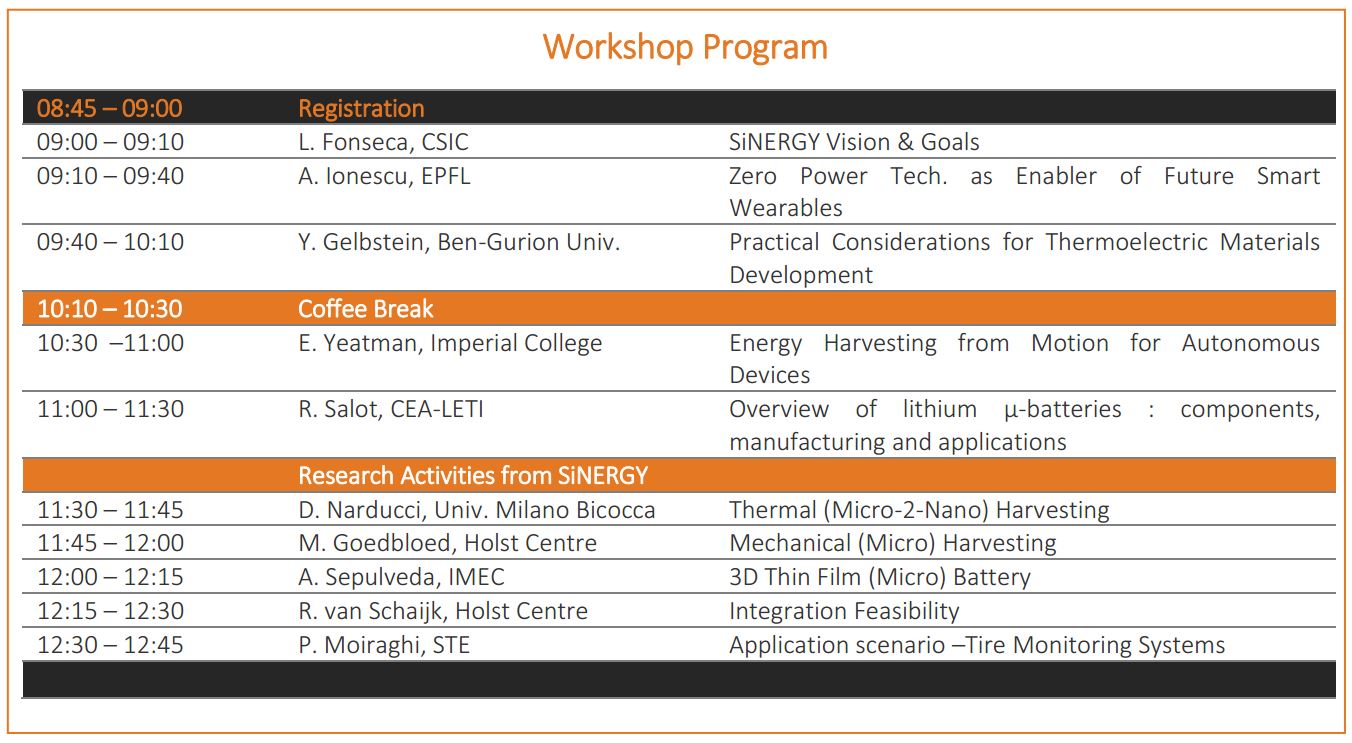
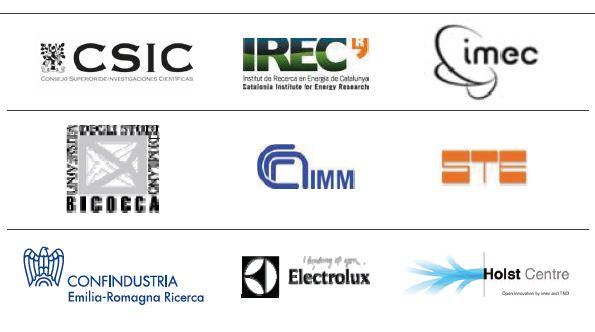
Fill out the form below to download all the presentations
Introduction - Luis Fonseca, Consejo Superior de Investigaciones Científicas (CSIC)
Download Luis Fonseca's Presentation
Practical Considerations for Thermoelectric Materials Development - Prof Yaniv Gelbstein, Ben-Gurion University of the Negev
Sinopsis
Thermoelectrics as a direct energy conversion method between heat and electricity is mainly used for electrical power generation and cooling applications.
In the frame of the EC-FP7 program, 11 thermoelectric related projects were funded for such purposes, in an average budget of 5M€ per project. Most of these projects are located in a Technology Readiness Level (TRL) of 3-5, aiming for approaching a practical prototype conversion unit.
A large variety of materials, such as intermetallic compounds (e.g. half-Heuslers), silicides and chalcogenides (e.g. PbTe and GeTe) have been identified as highly potential thermoelectric materials, due to high ZT values at different temperature ranges. Among these material classes, although currently showing lower ZTs, silicides and intermetallic compounds possess additional advantages due to improved mechanical properties, the ability to operate at higher temperatures and the potential for large scale commercialization, since they are composed of naturally abundant and less toxic elements.
Global trends for improving the thermoelectric efficiency via maximizing the ZT values include, electronic doping optimizations; generation of Functionally Graded Materials (FGMs) with an optimal maximal ZT envelope over a wide temperature range; and nanostructuring formation for reduction of the lattice thermal conductivity. Nanostructures generation can be achieved by nano-powdering using energetic ball-milling followed by a rapid consolidation method such as Spark Plasma Sintering (SPS). Yet, due to the demand for high stability characteristics, required for long operation periods at high temperatures, one approach for avoiding nano-features coarsening and thermoelectric properties degradation, is based on utilizing thermodynamically driven nanostructures, due to physical metallurgy based effects such as spinodal decomposition and nucleation and growth reactions.
All of the mentioned above practical considerations for development of practical thermoelectrical conversion units will be discussed during the talk. A focus on the related activities in the department of Materials Engineering at BGU will be given.
Download Yaniv Gelbstein's Presentation
Energy Harvesting from Motion for Autonomous Devices - Professor Eric Yeatman, Imperial College London
Synopsis
Driven by advances in microelectronics, sensors, and radio technology, highly miniature, low cost wireless devices are proliferating rapidly in a wide range of applications. This is enabling the distribution of sensing capability throughout urban and other environments, in the paradigm often known as pervasive sensing, as well as the enhancement of previously passive artefacts with intelligence and connectivity (the “Internet of Things”). These technologies offer major advantages, including enhanced energy efficiency, system resilience and adaptability, and the provision of new functions and services for users. However, adoption is significantly impeded by the maintenance burden of replacing or recharging huge numbers of batteries.
Energy harvesting – the collection of otherwise unexploited energy in the local environment – is attracting increasing attention as a solution to this problem. While the power levels that can be reached are typically modest (microwatts to milliwatts), this can be sufficient for an increasing range of wireless devices. This talk will focus on energy harvesting from motion, particularly machine vibration and human movement, and will present advances to date, fundamental limitations, applications and future trends.
Short biography:
Eric M. Yeatman has been a member of academic staff in Imperial College London since 1989, and Professor of Micro-Engineering since 2005. He is Deputy Head of the Department of Electrical and Electronic Engineering, and has published more than 200 papers and patents, primarily on optical devices and materials, and micro-electro-mechanical systems (MEMS). He is also Co-Director of the college's Digital Economy Lab, and Principal Investigator of the multi-faculty project Digital City Exchange. He is a Fellow and Silver Medalist of the Royal Academy of Engineering, and a Fellow of the IEEE. Prof. Yeatman is also co-founder and director of Microsaic Systems plc, which develops and markets miniature mass spectrometers for portable chemical analysis. His current research interests are in energy sources for wireless devices (particularly energy harvesting), radio frequency and photonic MEMS devices, pervasive sensing and sensor networks.
www.imperial.ac.uk/people/e.yeatman
Download Eric Yeatman's Presentation
Zero Power Technology as Enabler of Future Smart Wearables - Prof A. Ionescu, EPFL
Sinopsis
This talk will particularly address the state-of-the art in low power sensors, computation and communication technologies as part of the Zero-Power Technology concept, with particular focus on smart wearable applications. We will also detail recent progress in multi-parametric sensing as monitoring tool and feedback channel in wellbeing and medical applications.
Download Adrian Ionescu's Presentation
Overview of lithium µ-batteries : components, manufacturing and applications - Raphaël Salot, CEA-LETI
Sinopsis
Today’s miniaturised systems go beyond monolithically integrated or hybrid systems which combine measurement, data processing and storage functions. The future will consist of integrated smart systems which are able to sense and diagnose a situation, which are predictive, and therefore are able to make decisions. Today the miniaturisation of such devices is limited by the battery itself and particularly by the currently available micro power supply systems. Lithium microbatteries are energy storage components that could meet the stakeholders requirements.
State of the art of lithium microbatteries, both from a component and manufacturing point of view will be presented. Technological challenges to be addressed will be discussed. Finally, an overview of current and future applications will be done.
Download Raphael Salot's Presentation
Download Dario Narducci's Presentation
Download Sepulveda's Presentation
Download Rob van Schaijk's Presentation
Useful links
Links to the websites of partner institutions:
Consejo Superior de Investigaciones Científicas (CSIC)
Centro Nacional de Microelectrónica (CNM)
Confindustria Emilia-Romagna Ricerca
Catalonia Institute for Energy Research (IREC)
University of Milano‐Bicocca - UNIMIB
CNR IMM Institute of Microeletronics and Microsystem
Links of projects:
ZeroPower CSA
UK Energy Harvesting network
Guardian Angels Project - FET flagship finalist
MANPOWER - Towards Perpetually Self-powered Implants
ULTRAWIRE - Ultra Conductive Copper-Carbon Nanotube Wire
MATFLEXEND - New formulations for printable energy harvesting materials
E-STARS - Efficient Smart Systems with enhanced energy storage
ICT-ENERGY - Coordination activity among consortia involved in the ICT-ENERGY subject
E2Switch - Energy Efficient Tunnel FET Switches and Circuits
INTERFLEX - Interconnects for flexible foils and thin film batteries
GREENSILICON - Thermal energy harvesting using nanofabricated Silicon
NANOPOWER - Nanoscale energy management for powering ICT device
SiNAPS - Semiconducting Nanowire Platform for Autonomous Sensors
NanoHiTec - Nano-structured High-efficiency Thermo-Electric Converters
H2ESOT - Waste heat harvesting via organic thermoelectric devices
NANOCATE - Thermoelectric- and storage material based on nanocarbon
Other useful links:
Long-life Paper-Thin Batteries from STMicroelectronics to Power Tomorrow’s Tiny Tech - Read More
Macro-thermoelectricity (but also silicon nanowires in the pipeline) - Read More
Charging devices with... wood or boiling water - Read More
Powering a Bluetooth loudspeaker with a candle - Read More
Silicon nanostructures for thermoelectric devices: A review of the current state of the art - Read More
A new high ZT thermoelectric material - Read More
Energy Harvesting & Storage 2015. This seventh annual IDTechEx event provides insight into energy harvesting technologies, case studies and markets, ranging from consumer electronics and sensors all the way to vehicles, building and industrial automation - Read More
Engineers at UC San Diego have developed a nanoparticle-based material that converts 90% of captured sunlight to heat. With particle sizes ranging from 10 nanometers to 10 micrometers, the multiscale structure can withstand temperatures greater than 700 degrees Celsius. - Read More
Contacts
Luis Fonseca - Project Coordinator
IMB-CNM (CSIC)
Instituto de Microelectrónica de Barcelona
Centro Nacional de Microelectrónica
Consejo Superior de Investigaciones Científicas
Campus Universidad Autónoma de Barcelona
Bellaterra 08193
Spain
Telephone: +34- 5947700
Fax: +34-5801496
E-mail: This email address is being protected from spambots. You need JavaScript enabled to view it.

